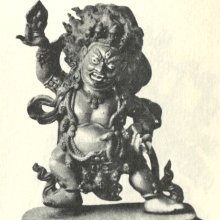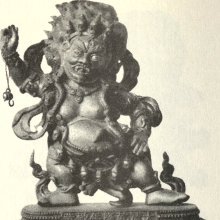Matsarya, Mātsarya: 24 definitions
Introduction:
Matsarya means something in Buddhism, Pali, Hinduism, Sanskrit, Jainism, Prakrit, Marathi, Hindi. If you want to know the exact meaning, history, etymology or English translation of this term then check out the descriptions on this page. Add your comment or reference to a book if you want to contribute to this summary article.
Alternative spellings of this word include Matsary.
Images (photo gallery)
In Hinduism
Purana and Itihasa (epic history)
Source: Wisdom Library: Viṣṇu-purāṇaMātsarya (मात्सर्य) refers to “envy” and represents a type of Ādhyātmika pain of the mental (mānasa) type, according to the Viṣṇu-purāṇa 6.5.1-6. Accordingly, “the wise man having investigated the three kinds of worldly pain, or mental and bodily affliction and the like, and having acquired true wisdom, and detachment from human objects, obtains final dissolution.”
Ādhyātmika and its subdivisions (e.g., mātsarya) represents one of the three types of worldly pain (the other two being ādhibhautika and ādhidaivika) and correspond to three kinds of affliction described in the Sāṃkhyakārikā.
The Viṣṇupurāṇa is one of the eighteen Mahāpurāṇas which, according to tradition was composed of over 23,000 metrical verses dating from at least the 1st-millennium BCE. There are six chapters (aṃśas) containing typical puranic literature but the contents primarily revolve around Viṣṇu and his avatars.

The Purana (पुराण, purāṇas) refers to Sanskrit literature preserving ancient India’s vast cultural history, including historical legends, religious ceremonies, various arts and sciences. The eighteen mahapuranas total over 400,000 shlokas (metrical couplets) and date to at least several centuries BCE.
Ayurveda (science of life)
Source: archive.org: Vagbhata’s Ashtanga Hridaya Samhita (first 5 chapters)Mātsarya (मात्सर्य) refers to “(the urges of) envy”, mentioned in verse 4.25 of the Aṣṭāṅgahṛdayasaṃhitā (Sūtrasthāna) by Vāgbhaṭa.—Accordingly, “[...] He, however, who desires welfare both after his death and here shall always suppress the urges of avarice, jealousy, hatred, envy, passion [viz., lobha-īrṣyā-dveṣa-mātsarya-rāga], etc. after having subjugated his senses [viz., jitendriya]”.
Source: gurumukhi.ru: Ayurveda glossary of terms1) Mātsarya (मात्सर्य):—Jealousy
2) [mātsaryaḥ] Feeling of grudge or Enviousness

Āyurveda (आयुर्वेद, ayurveda) is a branch of Indian science dealing with medicine, herbalism, taxology, anatomy, surgery, alchemy and related topics. Traditional practice of Āyurveda in ancient India dates back to at least the first millenium BC. Literature is commonly written in Sanskrit using various poetic metres.
Vaishnavism (Vaishava dharma)
Source: Pure Bhakti: Brhad BhagavatamrtamMātsarya (मात्सर्य) refers to:—Jealousy; envy. (cf. Glossary page from Śrī Bṛhad-bhāgavatāmṛta).

Vaishnava (वैष्णव, vaiṣṇava) or vaishnavism (vaiṣṇavism) represents a tradition of Hinduism worshipping Vishnu as the supreme Lord. Similar to the Shaktism and Shaivism traditions, Vaishnavism also developed as an individual movement, famous for its exposition of the dashavatara (‘ten avatars of Vishnu’).
Shaktism (Shakta philosophy)
Source: Google Books: ManthanabhairavatantramMatsarya (मत्सर्य) refers to “one who is envious”, according to the Manthānabhairavatantra, a vast sprawling work that belongs to a corpus of Tantric texts concerned with the worship of the goddess Kubjikā.—Accordingly, while describing the signs of one who is not a Siddha: “He is excessively tall, bald, deformed, short, dwarfish, his nose is ugly or he has black teeth and is wrathful . Some of his limbs are missing and is deceitful, cripple and deformed, foolish, inauspicious, envious [i.e., matsarya], deluded, badly behaved, and violent; without any teacher, he is devoid of the rites, he maligns the Krama without cause, he is not devoted to the Siddhas, he (always) suffers and is without wisdom. He is (always) ill and one should know that he is (always) attached (to worldly objects) and has no scripture. He has no energy and is dull and lazy. Ugly, he lives by cheating and, cruel, he is deluded, and devoid of (any) sense of reality. Such is the characteristic of one who is not accomplished (asiddha) in a past life”.

Shakta (शाक्त, śākta) or Shaktism (śāktism) represents a tradition of Hinduism where the Goddess (Devi) is revered and worshipped. Shakta literature includes a range of scriptures, including various Agamas and Tantras, although its roots may be traced back to the Vedas.
In Buddhism
Mahayana (major branch of Buddhism)
Source: Wisdom Library: Maha Prajnaparamita SastraMātsarya (मात्सर्य, “avarice”) refers to one of ten types of manifestly active defilements (paryavasthāna) according to Mahāprajñāpāramitāśāstra chapter 13.—The Bodhisattvas (accompanying the Buddha at Rājagṛha on the Gṛdhrakūṭaparvata) excelled in destroying various these ten manifestly active defilements (e.g., Mātsarya).
Mātsarya (मात्सर्य, “avarice”) according to chapter 36: “avarice (mātsarya) is a calamity: Because of it, one experiences sadness and fear. Bathing it with the water of generosity At once brings good fortune and happiness. [...] Condemning avarice (mātsarya) in many ways and praising generosity (dāna) is called ‘recollection of material generosity’ (āmiṣadāna-anusmṛti)”.
According to chapter L.—Accordingly, “[...] the Bodhisattva-Mahāsattva who wishes to not produce thoughts of avarice (mātsarya), immorality, malice, laziness, distraction or false wisdom should practice the perfection of wisdom”.—Thus, when the Bodhisattva is practicing generosity (dāna) and a mind of avarice (mātsarya) arises in him, it makes the gift impure (aviśuddha); sometimes, he will not give pure things; or if he gives external things, he does not give a lot of them; or if he gives inwardly, he does not give fully: all of this because of the thought of avarice (mātsarya).
Source: Bibliotheca Polyglotta: Akshayamatinirdesha (English translation)Mātsarya (मात्सर्य) refers to “envy”, according to the Akṣayamatinirdeśasūtra, an ancient Mahāyāna Sūtra devoted to the Bodhisattva Akṣayamati, recognized as one of the sixteen Bodhisattvas of the Bhadrakalpa (fortunate aeon).—Accordingly, as Akṣayamati said to Śāradvatīputra: “Further, reverend Śāradvatīputra, the Bodhisattvas’ intention is also imperishable. Why? [...] That intention of the Bodhisattvas, reverend Śāradvatīputra, should be seen as [pure] for the sake of getting rid of envy [in one’s own continuity of thoughts], but intention should be seen as imperishable through maturing envious beings [in having endless numbers of envious living beings as the object (ananta-mātsarya-sattvālambanatvāt)]; [...]”.

Mahayana (महायान, mahāyāna) is a major branch of Buddhism focusing on the path of a Bodhisattva (spiritual aspirants/ enlightened beings). Extant literature is vast and primarely composed in the Sanskrit language. There are many sūtras of which some of the earliest are the various Prajñāpāramitā sūtras.
General definition (in Buddhism)
Source: Wisdom Library: Dharma-samgraha1) Mātsarya (मात्सर्य, “selfishness”) refers to one of the fourty “conditions” (saṃskāra) that are “associated with mind” (citta-samprayukta) as defined in the Dharma-saṃgraha (section 30). The Dharma-samgraha (Dharmasangraha) is an extensive glossary of Buddhist technical terms in Sanskrit (e.g., mātsarya). The work is attributed to Nagarjuna who lived around the 2nd century A.D.
Mātsarya also refers to one of the “twenty-four minor defilements” (upakleśa) as defined in the Dharma-saṃgraha (section 69).
2) Mātsarya (मात्सर्य) refers to the “five selfishnesses” as defined in the Dharma-saṃgraha (section 78):
- dharma-mātsarya (selfishness regarding dharma),
- lābha-mātsarya (selfishness regarding wealth),
- āvāsa-mātsarya (selfishness regarding dwellings),
- kuśala-mātsarya (selfishness regarding wholesomeness),
- varṇa-mātsarya (selfishness regarding class).
The Dharma-samgraha (Dharmasangraha) is an extensive glossary of Buddhist technical terms in Sanskrit (e.g., mātsarya). The work is attributed to Nagarguna who lived around the 2nd century A.D.
Source: Google Books: Divine StoriesMātsarya (मात्सर्य, “avarice”) refers to one of the “Nine bonds to Existence” (navasaṃyojana).—The term saṃyojana is usually translated as “fetter,” but these nine [e.g., avarice (mātsarya)] do not correspond to the standard list of fetters (e.g, ten fetters, five lower fetters, three fetters).
In Jainism
General definition (in Jainism)
Source: Wisdom Library: JainismMātsarya (मात्सर्य, “jealousy”) refers to “non-imparting (out of jealousy) of true knowledge” and it is one of the causes leading to the influx (āsrana) of karmas which obscure knowledge and perception.
Mātsarya is a Sanskrit technical term defined in the Tattvārthasūtra (ancient authorative Jain scripture) from the 2nd century, which contains aphorisms dealing with philosophy and the nature of reality.
Source: Encyclopedia of Jainism: Tattvartha Sutra 6: Influx of karmasMātsarya (मात्सर्य).—What is meant by ‘non-imparting knowledge out of jealousy (mātsarya)’? Not responding to a query by a learned person i.e. does not reply thinking that the person seeking knowledge will become equal or more than him, is non-imparting knowledge out of jealousy / envy (mātsarya).

Jainism is an Indian religion of Dharma whose doctrine revolves around harmlessness (ahimsa) towards every living being. The two major branches (Digambara and Svetambara) of Jainism stimulate self-control (or, shramana, ‘self-reliance’) and spiritual development through a path of peace for the soul to progess to the ultimate goal.
Languages of India and abroad
Marathi-English dictionary
Source: DDSA: The Molesworth Marathi and English Dictionarymātsarya (मात्सर्य).—n S Envy, impatience of another's excellence or prosperity.
Source: DDSA: The Aryabhusan school dictionary, Marathi-Englishmātsarya (मात्सर्य).—n Envy. Impatience of one's excellence or prosperity.
Marathi is an Indo-European language having over 70 million native speakers people in (predominantly) Maharashtra India. Marathi, like many other Indo-Aryan languages, evolved from early forms of Prakrit, which itself is a subset of Sanskrit, one of the most ancient languages of the world.
Sanskrit dictionary
Source: DDSA: The practical Sanskrit-English dictionaryMātsarya (मात्सर्य).—
1) Envy, jealousy, spite, malice; अहो वस्तुनि मात्सर्यम् (aho vastuni mātsaryam) Kathāsaritsāgara 21.49; Kirātārjunīya 3.53; मात्सर्यमुत्सार्य विचार्य धूर्याः (mātsaryamutsārya vicārya dhūryāḥ) S. D.
2) Displeasure.
Derivable forms: mātsaryam (मात्सर्यम्).
Source: Cologne Digital Sanskrit Dictionaries: Shabda-Sagara Sanskrit-English DictionaryMātsarya (मात्सर्य) or Mātsaryya.—n.
(-ryaṃ) Envy, malice. E. matsara envious, and ṣyañ aff.
Source: Cologne Digital Sanskrit Dictionaries: Benfey Sanskrit-English DictionaryMātsarya (मात्सर्य).—i. e. matsara + ya, n. 1. Envy, [Hitopadeśa] i. [distich] 194, M. M. 2. Malice.
Source: Cologne Digital Sanskrit Dictionaries: Cappeller Sanskrit-English DictionaryMātsarya (मात्सर्य).—[neuter] envy, jealousy, discontent.
Source: Cologne Digital Sanskrit Dictionaries: Monier-Williams Sanskrit-English Dictionary1) Mātsarya (मात्सर्य):—[from mātsara] n. envy, jealousy, [Maitrāyaṇī-saṃhitā]Up, [Mahābhārata] etc. (with Buddhists 5 kinds are named, [Dharmasaṃgraha 78]; ryaṃ-√kṛ, to show jealousy, [Mahābhārata])
2) [v.s. ...] displeasure, dissatisfaction, [Kathāsaritsāgara]
Source: Cologne Digital Sanskrit Dictionaries: Yates Sanskrit-English DictionaryMātsarya (मात्सर्य):—(ryyaṃ) 1. n. Envy, malice.
Source: DDSA: Paia-sadda-mahannavo; a comprehensive Prakrit Hindi dictionary (S)Mātsarya (मात्सर्य) in the Sanskrit language is related to the Prakrit word: Macchara.
[Sanskrit to German]
Sanskrit, also spelled संस्कृतम् (saṃskṛtam), is an ancient language of India commonly seen as the grandmother of the Indo-European language family (even English!). Closely allied with Prakrit and Pali, Sanskrit is more exhaustive in both grammar and terms and has the most extensive collection of literature in the world, greatly surpassing its sister-languages Greek and Latin.
Hindi dictionary
Source: DDSA: A practical Hindi-English dictionaryMātsarya (मात्सर्य) [Also spelled matsary]:—(nm) jealousy, envy; malice.
...
Kannada-English dictionary
Source: Alar: Kannada-English corpusMātsarya (ಮಾತ್ಸರ್ಯ):—
1) [noun] a feeling of discontent or covetousness with regard to another’s advantages, success, possessions, etc. which one does not, but desired to, have; envy.
2) [noun] lack of content; dissatisfaction; discontentment.
3) [noun] (jain.) a fault or demerit of envying one’s own disciple.
Kannada is a Dravidian language (as opposed to the Indo-European language family) mainly spoken in the southwestern region of India.
See also (Relevant definitions)
Starts with: Matsaryacitta, Matsaryasamyojana, Matsaryasattva, Matsaryavajra.
Ends with: Amatsarya, Anantamatsarya, Avasamatsarya, Dharmamatsarya, Durmatsarya, Kushalamatsarya, Labhamatsarya, Nirmatsarya, Purmatsarya, Savatimatsarya, Varnamatsarya.
Full-text (+33): Macchara, Matsariya, Amatsaryata, Five Selfishnesses, Amatsarya, Durmatsarya, Matsaryya, Matsarika, Ashtaragadis, Ashtakashta, Kalusa, Matsary, Labhamatsarya, Purmatsarya, Varnamatsarya, Marcariyam, Dharmamatsarya, Avasamatsarya, Kushalamatsarya, Parivarjanata.
Relevant text
Search found 24 books and stories containing Matsarya, Mātsarya; (plurals include: Matsaryas, Mātsaryas). You can also click to the full overview containing English textual excerpts. Below are direct links for the most relevant articles:
Bhakti-rasamrta-sindhu (by Śrīla Rūpa Gosvāmī)
Verse 2.4.195 < [Part 4 - Transient Ecstatic Disturbances (vyābhicāri-bhāva)]
Bhajana-Rahasya (by Srila Bhaktivinoda Thakura Mahasaya)
Text 11 < [Chapter 2 - Dvitīya-yāma-sādhana (Prātaḥ-kālīya-bhajana)]
Tattvartha Sutra (with commentary) (by Vijay K. Jain)
Verse 7.36 - The transgressions of Atithisaṃvibhāga-vrata < [Chapter 7 - The Five Vows]
Verse 6.10 - The nature of Knowledge-obscuring and Perception-obscuring Karmas < [Chapter 6 - Influx of Karmas]
Sahitya-kaumudi by Baladeva Vidyabhushana (by Gaurapada Dāsa)
Text 7.91 < [Chapter 7 - Literary Faults]
Hari-bhakti-kalpa-latikā (by Sarasvati Thkura)
Text 41-42 < [Second Stabaka]
Jivanandana of Anandaraya Makhin (Study) (by G. D. Jayalakshmi)
Analysis of Vicāra (Nāgarika) < [Chapter 6 - Dramatic aspects of the Jīvanandana Nāṭaka]
The inborn enemies of Jīva < [Chapter 5 - Advaitic principles in Jīvanandana Nāṭaka]
Act V (Summary) < [Chapter 3 - Summary of the Play Jīvānandana Nāṭaka]

